Natural Capital and Biodiversity
Kioxia Group recognizes that biodiversity is the capital of a sustainable society, and that it is an extremely important asset in addressing global issues such as climate change and resource constraints. We believe that maintaining a healthy natural environment supports the sustainability of people’s lives, society and business activities. As such, we promote initiatives through our business activities that contribute to the preservation of biodiversity and the sustainable use of natural resources.
Kioxia Group is working to reduce its environmental impact by providing a continuous supply of large-capacity flash memory products that deliver high energy efficiency and high-speed data processing. We will also leverage our strengths as a semiconductor manufacturer to promote biodiversity preservation through appropriate management of water resources and environmental preservation activities at our plants. In addition, guided by Kioxia Group’s Environmental Policy, we will promote feasible and phased measures, while taking into account international developments, including those related to the Taskforce on Nature-related Financial Disclosures (TNFD).
Governance and Risk Management
Kioxia Group is promoting a strategic response to natural capital and biodiversity issues under Kioxia Group’s sustainability promotion structure, with active engagement from senior management. The Sustainability Strategy Meeting, chaired by the President and CEO, deliberates on key themes and evaluates related measures.
To address nature-related issues, a dedicated taskforce is responsible for coordinating efforts across relevant departments to set specific targets and execute response measures. In line with the TNFD recommendations, we conduct risk and opportunity analyses, scenario evaluations, and reviews of metrics and targets, as well as monitoring. The aim of these efforts is to more accurately grasp the interconnections between our business activities and the natural environment, and to explore ways to build a sustainable business foundation.
Please see “Sustainability Management” for details on our sustainability management structure.
Strategy
Kioxia Group recognizes the importance of natural capital and ecosystem services, and is working to align its disclosures with the recommendations of the TNFD. In FY2024, we conducted the “Locate” phase of the “LEAP Approach” (identifying areas potentially vulnerable to nature-related impacts) at Kioxia Corporation’s Yokkaichi Plant, Kioxia Iwate Corporation, and Solid State Storage Technology Corporation (SSSTC). Going forward, we will examine in detail the findings from the Locate phase in preparation for disclosure, while advancing to the “Evaluate” and “Assess” phases. In these phases, we will identify and evaluate dependencies and impacts on natural capital, while organizing associated risks and opportunities.
Kioxia Group approaches natural capital from a medium- to long-term perspective. Initially, we will assess the current state through qualitative assessments, and then gradually develop metrics and targets based on evolving scientific knowledge and trends in external initiatives. We remain committed to contributing to the realization of a sustainable society in harmony with nature.
Metrics and Targets
Kioxia Group in Japan has established metrics and targets related to natural capital. Environmental targets have been set as relative values, using the environmental impact per unit of product capacity during manufacturing in FY2017 as a baseline (100%). Based on these, we have been working to reduce energy-related CO2 emissions of PFCs and other gases, waste generation, water intake, and chemical substance emissions. All targets were successfully achieved again in FY2024.
Going forward, we plan to refine our natural capital-related metrics and targets based on the results of the LEAP approach.
Please see “Current Status of Environmental Impact and Environmental Targets and Outcomes” for details.
Activities
Kioxia Group engages in a variety of biodiversity conservation and social contribution activities in order to coexist with the rich ecosystems in the areas where we operate.
Watching Over Forest and River Creatures
Kioxia Corporation’s Yokkaichi Plant is participating in an owl protection project being undertaken by the Natural Study Group at Yokkaichi-Nishi High School and the MIRAI Lab at Kuwana High School. We provide equipment enabling owls in the area to be observed and protected in their natural habitat. This supports the project’s aim of bequeathing the region’s rich natural environment to future generations.
Kioxia Iwate Corporation participated in the Iwate Prefecture Aquatic Life Survey.1 In 2024, the company conducted a survey of the Waga River, which flows through the southwest part of Iwate Prefecture. The presence of indicator species such as the flat-headed mayfly confirmed that the water environment was clean. Through this initiative, we are promoting the preservation of aquatic ecosystems and collaboration with the local community.
- 1 A survey that classifies water quality into four grades, from Grade I (clean water typical of upstream mountain stream) to Grade IV (heavily polluted water). Points are assigned to each collected indicator species in accordance with a scoring system. The total score determines the water quality grade for the site, with the grade receiving the highest score applied to the site. The presence of flat-headed mayflies corresponds to Grade I water quality.
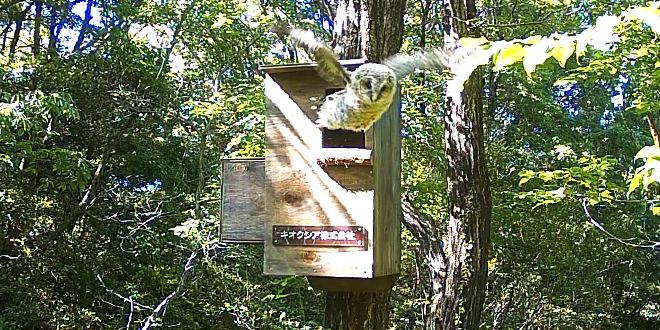
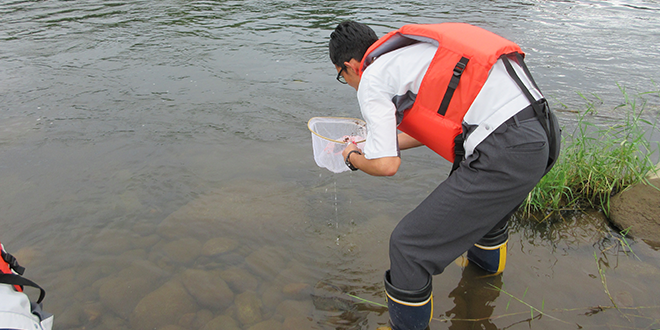
Conservation of Marine, Mountain, and River Environments
Kioxia Corporation’s Yokkaichi Plant participates in cleanup activities at Yoshizaki Beach (Kusu Town, Yokkaichi City, Mie Prefecture), organized by the Kusu Town Development Committee and the NPO Yokkaichi Sea Turtle Preservation Society, with the aim of preserving the nesting environment of the endangered loggerhead turtle.2 In 2024, over 200 people—including plant employees and their family members—participated in the cleanup activities, helping to protect the environment where loggerhead turtles lay their eggs, and to deepen their understanding of the ecosystem and the importance of conservation efforts.
SSSTC is engaged in activities to conserve coastal biodiversity and enhance mountain water retention capacity. In March 2025, around 40 SSSTC employees participated in a cleanup of the Touqian River estuary in Hsinchu, Taiwan, collecting more than 300 kg of waste. Employees also planted 200 trees native to Taiwan on Mt. Emei.
- 2 The loggerhead turtle is classified as an endangered species in the Ministry of the Environment’s “Red List,” indicating they are at high risk of extinction in the wild in the near future.
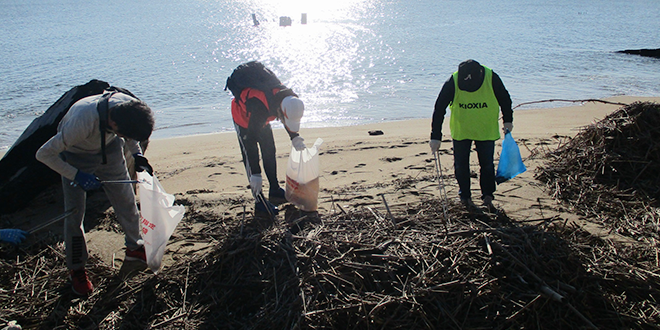
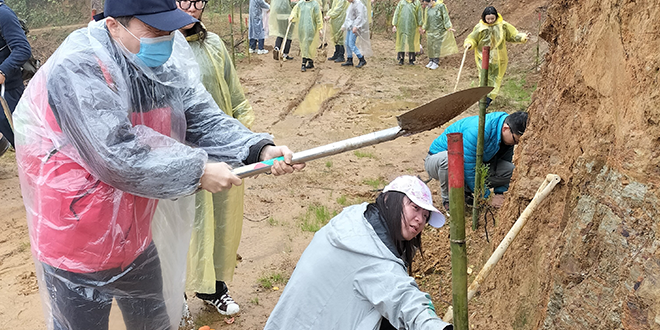
Supporting Local Culture and Nature
The city of Kitakami in Iwate Prefecture is running a Sakura-mori project whereby cherry blossom guardians are trained to take care of the cherry trees in Tenshochi Park,3 a famous cherry blossom viewing spot in the city, with the aim of preserving the cherry blossom trees for the next 100 years. Kioxia Iwate Corporation supports the continuation of local cultural and ecological heritage and participates in the Sakura-mori Workshop. In the 2024 event, around 30 employees and their family members helped with the pruning and fertilizing of young cherry trees.
Kioxia Group’s research and technology development base, Yokohama Technology Campus, participates in the Sakae Green Supporter program in Sakae Ward, Yokohama City, Kanagawa Prefecture. In 2024, a total of 20 employees contributed to the sustainability of local greenery and water resources through activities such as bamboo forest thinning and rice planting.
SSSTC is supporting opportunities for local communities to learn about biodiversity. Through its support for Hsinchu Zoo in Taiwan, SSSTC contributes to running a summer school for elementary school students to learn about animals and to the provision of equipment to the zoo.
Kioxia Group is committed to protecting the natural environment and preserving local culture through these activities.
- 3 Tenshochi Park celebrated its 100th anniversary in 2021 and is famous for its cherry blossoms, having been selected as one of the "100 Best Cherry Blossom Spots in Japan."
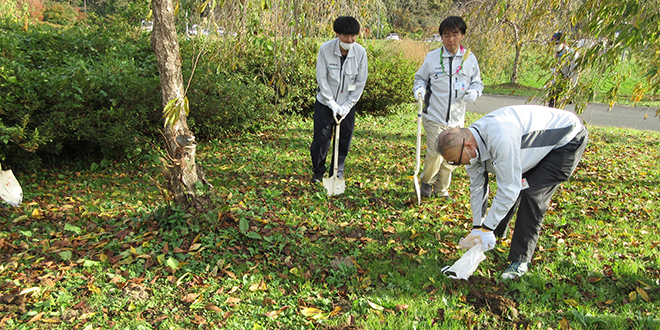
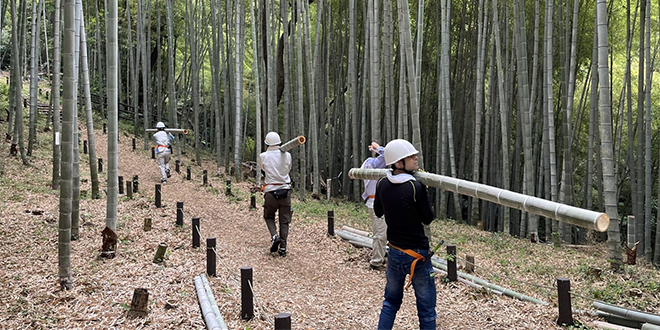
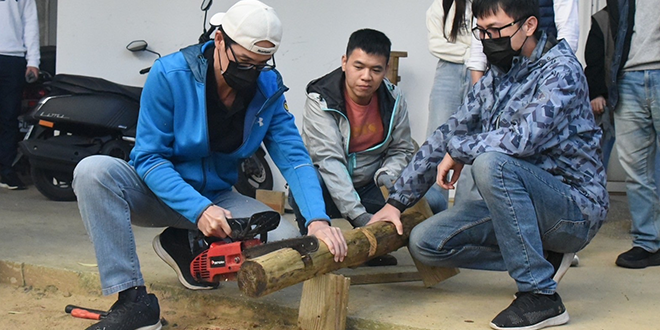
Enriching the Work Environment with More Greenery
At our manufacturing sites, cross-departmental greening activities are being carried out to enhance employees’ environmental awareness and improve the overall appearance of the premises.
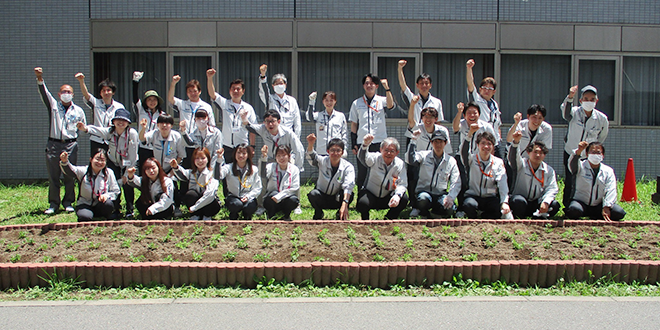
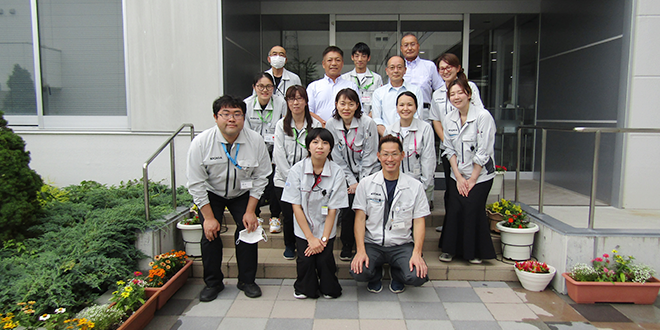
Hungry? Take the Sustainable Lunch Challenge
Every other week, SSSTC provides employees with lunches made with locally harvested vegetables. Employees who correctly answer quizzes on sustainability topics such as environmental conservation and resource use can receive a lunch. This initiative increases environmental awareness among employees while offering an enjoyable way to experience the benefits of local production for local consumption.
These activities reflect Kioxia Group’s commitment to coexisting with nature. We will continue to collaborate with local communities to ensure our business operations remain in harmony with biodiversity.